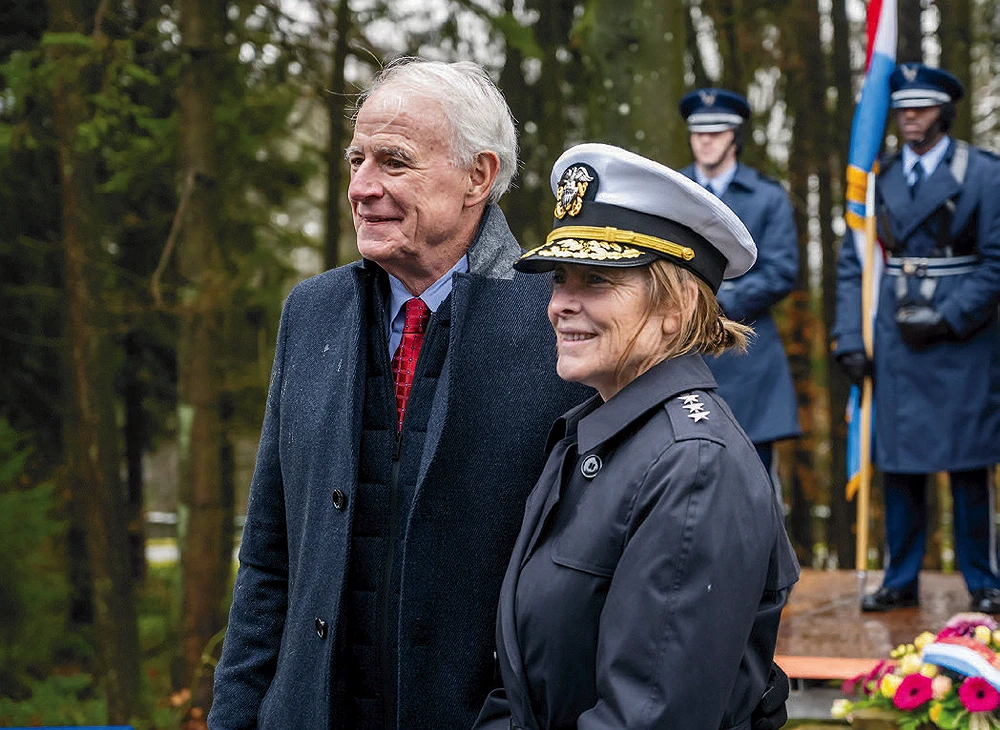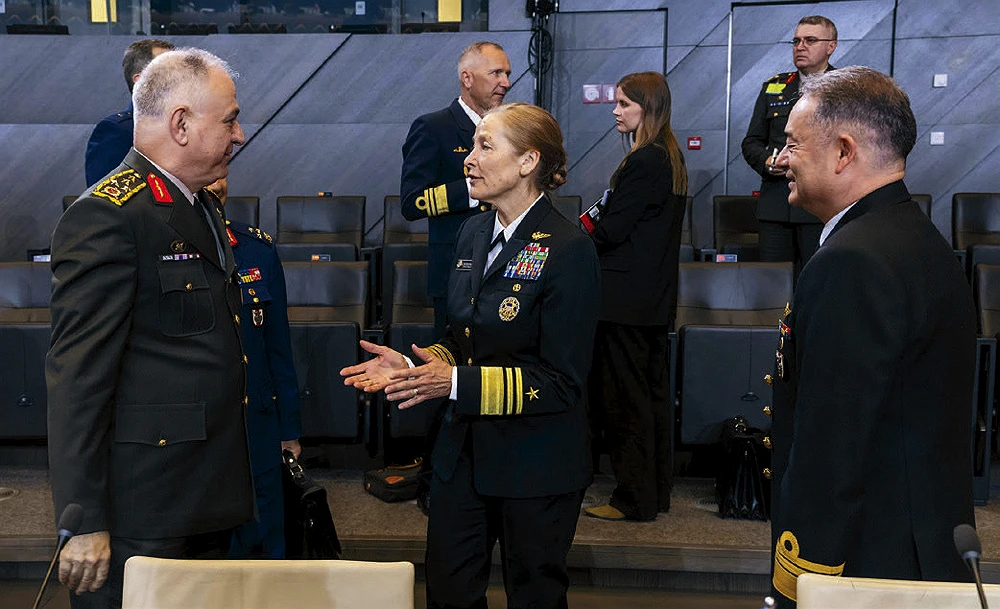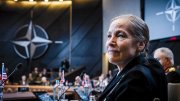Amid leadership crises across Europe and mounting economic and defense concerns, U.S. Navy Vice Admiral Shoshana Chatfield, M.P.A. ’97, is on the front lines of diplomacy, working with allies to do “everything we can to promote a global security environment and avoid war.”
As the U.S. military representative to the military committee at the North Atlantic Treaty Organization (NATO), she has been strategizing to thwart numerous threats during the last 14 tumultuous months. With the new U.S. administration taking shape at press time, her future role was unknown. Acknowledging that, she echoes what NATO’s former Secretary General, Jens Stoltenberg, often pointed out during his tenure. “There have been a lot of elections and outcomes from elections during NATO’s 75 years of existence,” she says, “and still, NATO endures. In times like this it’s important to focus on the role of NATO as a defensive organization, one in which 32 nations now come together utilizing diplomacy and dialogue to talk about ways to position themselves to defend about a billion people.”
Chatfield’s path to her NATO responsibilities is no accident. A career Navy helicopter pilot who studied leadership at the Kennedy School before earning a doctorate in education, she has commanded helicopter sea combat (HSC) units and served two postings in Guam; more recently she was the first female president of the Naval War College before being promoted to vice admiral and taking the NATO post.

Yet growing up in Garden Grove, California, she had no intention of joining the military. Passionate about French, she enjoyed being an exchange student in Montréal dur-ing high school. When she became the first in her family to attend college, at Boston University, she planned to major in French and international relations. She worked all summer before freshman year, saving $130, and then bought an Ameripass and boarded a Greyhound bus to school. “Now, I would invite anybody to try that,” she says. “It was 1983. I was 17 years old. Four days on the bus. No cell phone.”
Somewhere in the middle of that trip, having finished all her books, Chatfield began watching scenes of American life pass by as snippets of past conversations floated through her mind. Among them was her high school history teacher “chiding us about being spoon-fed and challenging us—would we give something back?” She thought, “When I look back at my life, what do I want to have done?” she recalls, “and I thought—it just came to me—‘I want to have served my country.’” That idea came with a sense of “resoluteness,” she says, as “a deal you make with yourself.” Moreover, something struck her deeply about the specialness of her country. “And I can tell you that the more I did travel, the more fortunate I felt to have been born in America, to have been born and raised in Southern California, to the parents that I have, to the time it was,” she says. “And just to be able to maneuver with freedom and with opportunity in the world. I consider myself very lucky.”
Arriving in Boston, she worked while attending classes and sought out the Reserve Officers’ Training Corps (ROTC) program, drilling with fellow naval cadets. By second semester she’d been offered a full ROTC scholarship, just as her parents were increasingly concerned about the price of BU. After earning her naval commission and graduating in 1987, she went to flight school. She was lonely and faced a challenging, competitive environment, and again made a deal with herself: “No quitting.” She believed then that if she succeeded, “I would carry a certain amount of credibility with me throughout my life.”

Chatfield qualified as a naval pilot in 1989 and continued to advance, although she says “the competition, for me, was always with myself. Can I get qualified quickly? Can I get qualified again? Can I do all of these things, operationally?” (Among the aircraft she flew from 1989 through 2013 were the Boeing Vertol CH-46 Sea Knight, Sikorsky SH-3 Sea King, and the Sikorsky MH-60S Knighthawk.) At the same time, she had other interests and desires. French. International relations. Education. These were nearly impossible to pursue while on an ambitious military track. After several successful assignments, however, she got the chance to pursue a mid-career master’s degree at the Kennedy School, where she studied leadership. It was “a wonderful time,” when she could pick her own courses and express a natural enthusiasm without having to repeatedly prove herself under constant scrutiny. She also cites the value of getting to know a diverse set of students—like the fellows from the developing world, “people who had come from conflict zones, people who were going to re-enter their countries where there was violence,” she says. “All of that was just so expansive to me.”
Equally formative was a non-credit course on leadership at the Fletcher School of Law and Diplomacy at Tufts, where Chatfield cross-enrolled. Taught by former NATO Supreme Allied Commander in Europe General John Galvin, it emphasized four essential elements of leadership: self-awareness, teamwork, communication, and sensitivity to change. That course, coupled with an informal six-week coaching session on women and public speaking (through Harvard Business School), bolstered confidence in her own ability to lead. Learning “how to stand in front of people and present yourself,” she says, “how to stand, how to control my voice, the amount of energy that I use in speaking,” was invaluable because “when you begin to speak, you’re either taken seriously and people give you their attention, or they invent a reason not to….I learned so much about how I could be seen if I was willing to work on it.” Most people, she adds, think that there are “‘natural born leaders,’ and I know it’s not true. You have the ability to work on new skills, focus on understanding other people’s perspectives.”
Chatfield went on to earn a doctorate in education at the University of San Diego in 2009 (with a dissertation study on interim Navy leaders) as she continued to rise through the ranks. From 2011 to 2013 she served as type wing commander of HSC Wing, U.S. Pacific Fleet (administratively responsible for all personnel, training, equipment, and maintenance programs). Her first posting to Belgium was as senior military assistant with the Supreme Headquarters Allied Powers Europe, and then, with her promotion to rear admiral in 2015, she became the deputy U.S. military representative to the NATO military committee in Brussels (serving until 2017).
Two years later she became the first woman president of the Naval War College. Leading the institution, with its more than 600 students from across the armed services, through the COVID pandemic, she also worked to diversify the faculty. Notably, she often prefers to tell people, “I was the first helicopter pilot” to be president. Speaking at the college’s 2023 Women, Peace, and Security symposium, Chatfield pointed to the significant role women play in peace-building, community cohesion, and diplomacy efforts. Yet in the field her own credentials have been questioned more than once. In 2005-06, while commanding a 500-person squadron (HSC-25), she recalls, “a mid-grade sailor...asked, “Ma’am, can you fly one of those helicopters?’ And I chuckled and said, ‘Yes, actually it’s a prerequisite for this job!’” The supply officer had asked the same question, even though in both instances she was in uniform, wearing the gold wings that designate her as a naval aviator. As the era of “first this, first that” recedes, however, she sees a new period rising, “where a person’s immediate assumption is that the organization is filled with professionals who have the qualifications and experience their jobs require at every level,” she says. “We’re certainly a lot closer now than we were then.”
Throughout her career, Chatfield says she has remained, at core, “still very much like the girl who got on the Greyhound, future-oriented, optimistic, adventurous, and patriotic.” At NATO, her military-advisory role has meant bringing all she has learned—through training and command posts, her academic grounding in leadership and international relations—to bear in offering strategic advice to the organization’s political leaders.
“The instruments of state power are being applied in different ways—and sure, it might have been happy if everybody just let it ride for another 20 or 30 years.”
Across the globe, “the instruments of state power are being applied in different ways—and sure, it might have been happy if everybody just let it ride for another 20 or 30 years. Let the peace dividend just keep playing out,” she says. But that’s not realistic. NATO forces are still on duty in Kosovo, Bosnia, and Iraq, and facing intensifying pressure elsewhere. During NATO’s seventy-fifth summit, held last summer in Washington, D.C., Frederick Kempe, president of the Atlantic Council think tank, noted that NATO “faces a new axis of authoritarians—with China, Russia, Iran, and North Korea in the lead...working more closely together on defense-industrial issues than any such grouping before them, including Germany, Italy, and Japan in the 1930s and the Soviet Union and China in the 1950s.”
What does that mean for NATO now? Here, she speaks definitively: “NATO needs to stay together. The transatlantic peace depends on it. And so that’s our center of gravity. The one thing we can’t let break.”
The countries engaged in this new power struggle, pushing for a new paradigm, have a conception “of security that is way different than ours is in the West,” she says. The People’s Republic of China (PRC), likewise, “is looking...to be more influential on the global stage. They picked us as a comparator. It’s a compliment, right? If they are going to pick a navy to beat, the greatest navy in the world, they are going to pick ours, right? And so, from the U.S. point of view, we cannot ignore these threats.”
“We have a wonderful economy, we have an innovative people, and we are unconstrained by the kind of authoritarian regimes that exist in the PRC and Russia,” Chatfield adds. “So that when we need to go fast, we will go fast. And we have done it before.”






